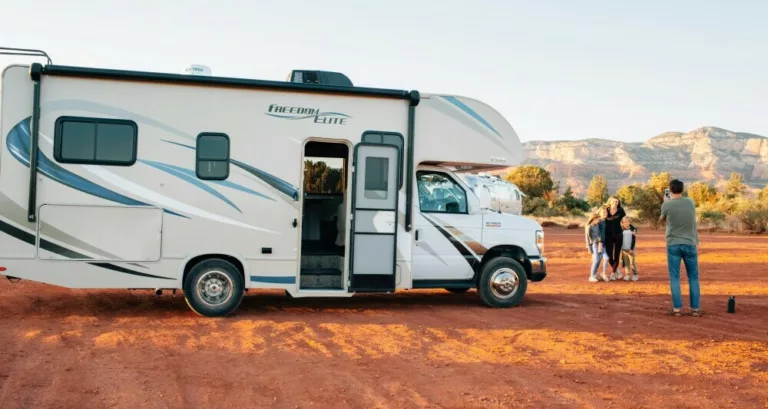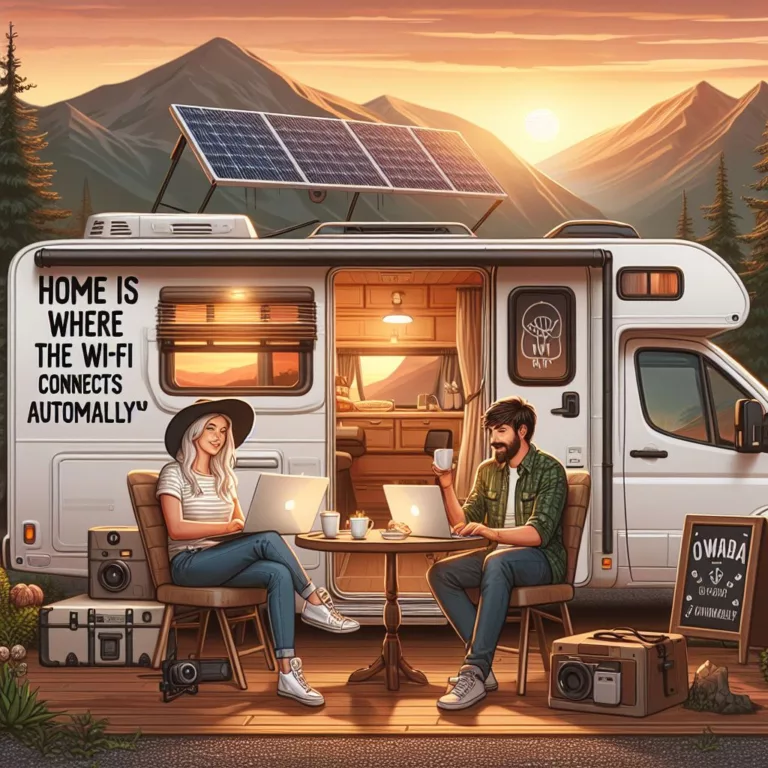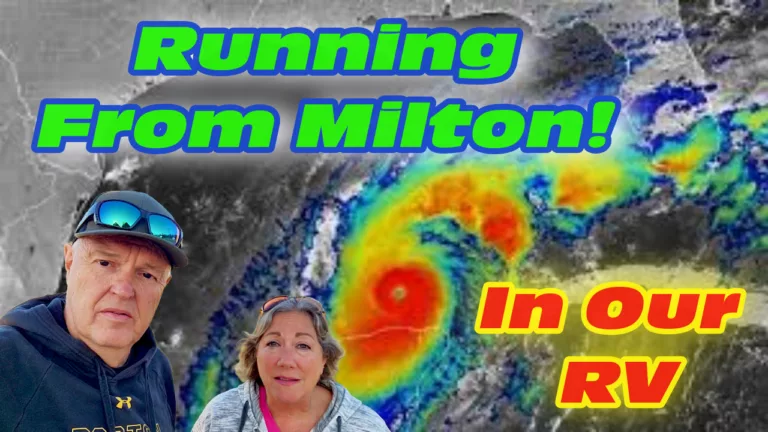How Much Does Full-Time RV Living Really Cost?
About the Authors: Scott & Amie – The Road Roamers
Scott and Amie are the full-time RV couple behind The Road Roamers YouTube channel and RoamersRVGear.com. With Scott’s 27 years of auto body expertise and Amie’s 25 years in real estate, they deliver practical, tested advice on all aspects of RV life. Traveling the U.S. in their 35-foot Alliance Avenue fifth wheel, Ava, and their dog Molly, they’ve faced the real-world financial realities of the RV lifestyle firsthand.
Jumping into the full-time RV life seems like an adventurous journey—and it absolutely is—but understanding the financial side is crucial for making it work long-term. While many folks think life on the road means ditching high living costs, the reality “CAN” be quite different. Trash the old myth that RV living is dirt cheap. There are real costs involved, and knowing those is your ticket to freedom.
First off, consider what you’re really paying for. There’s the rig itself, fuel to hit the open road, and things like insurance just like you’d have living anywhere. “This life isn’t about escaping reality but budgeting for a new one”. It’s not just RV costs we’re talking about; it’s a whole financial lifestyle change.
Before you get started, mapping out your budget isn’t just a ‘nice to have’—it’s essential. Some jump into the adventure thinking it’s all easy street, only to find themselves caught off guard by expenses they hadn’t planned for. Finding your footing with RV life means taking a deep look at what it costs month-to-month on your journey.
Think of this as your up-front guide: you’ll learn how your own spending habits fit into a full-time RV budget. Whether you’re traveling Solo, as a Couple, or with Family, you’ve got unique needs. By figuring out the true costs, you’ll be gearing up to hit the road with the confidence that you can support your dreams without financial hiccups.
For a broader look at key lifestyle questions before hitting the road, check out our post: 10 Things To Consider About Full-Time RVing It’s a great companion read!
Here’s a little transparency: Our website contains affiliate links. This means if you click and make a purchase, we may receive a small commission. Don’t worry, there’s no extra cost to you. It’s a simple way you can support our mission to bring you quality RV related content.
Fixed vs. Variable Costs
Understanding the diverse streams of expenses in full-time RV living is at the heart of smart budgeting. Let’s break down the financial nitty-gritty into two main categories: Fixed costs and Variable costs. Knowing the difference helps you design a solid financial plan for life on wheels.
Fixed costs are your steady players—whether you’re moving or parked. They include things like monthly RV loan payments, insurance premiums, and registration fees. These costs are predictable, making them easier to budget for each month. If you’ve got a loan on your rig, count on this as a recurring commitment, much like a mortgage.
Variable costs, on the other hand, can shift like the weather. Fuel prices are a biggie here, bouncing up and down depending on where you fill up. Campground fees also vary widely, from wallet-friendly state parks to pricier RV resorts. Adding to that, maintenance expenses for your vehicle might pop up unexpectedly. Keeping a little wiggle room in your budget for these costs is a smart move. We talk more about that below!
Managing these expenses boils down to planning. Track your previous expenses to spot trends, and set aside an emergency fund for those pesky surprises. Pro tip: Apps and budgeting software can be lifesavers for keeping tabs on routine and unexpected expenses alike.
Whether you’re a weekend warrior or aiming for full-time RVing wanderlust, getting a grip on fixed versus variable costs turns your dream of RV living from a leap of faith into a well-timed jump. It’s all about balancing steady payments with flexible funds to tackle roads less traveled with peace of mind.
Here is a simplified list of some Fixed Cost and Variable Cost items we have found helpful.
Fixed Costs (generally predictable each month):
- RV loan payment (if financed)
- RV insurance
- Tow vehicle or motorhome insurance
- Internet & phone plans (Starlink, hotspots, cell)
- Mail forwarding service (e.g., Escapees, Traveling Mailbox)
- Memberships (Thousand Trails, Harvest Hosts, Boondockers Welcome, Passport America)
- Storage unit (for items you left behind)
Variable Costs (fluctuate month-to-month):
- Campsite/RV park fees
- Fuel (gas or diesel)
- Propane (for heating, cooking, refrigerator)
- Electricity, water, sewer (sometimes separate in long-term stays)
- Dump station fees (if boondocking)
- Maintenance and repairs (RV + tow vehicle)
- Tolls and road fees
- Laundry (at campgrounds or laundromats)
- Groceries and dining out
- Entertainment, activities, tours
- Health insurance, medical expenses
- Pets (food, vet care, etc.)
- Upgrades and RV accessories
Click Below to get a discounted price on Harvest Hosts

Sample Budgets: For Solo, Couple and Family Travelers
Creating a realistic budget for life on the road is as personal as choosing the right RV. Let’s break it down into three different life scenarios: solo travelers, couples, and families, each with unique needs and expenses.
For those hitting the open road solo, expenses might lean towards flexibility and personal choice. Think about a monthly budget covering everything from fuel for solo adventures to personal indulgences like solo room rentals or quirky roadside attractions. An average budget for solo travelers could start around $900 to $1,950 monthly, covering basic needs while leaving room for some spontaneous adventures.
Solo Travelers (Budget-Conscious Boondocker)/
Expense Category | Monthly Cost |
Campsites (mostly free boondocking, occasional paid) | $100 – $300 |
Fuel (light travel) | $150 – $300 |
RV/vehicle insurance | $100 – $200 |
Internet & phone | $100 – $200 |
Groceries | $300 – $500 |
Entertainment/activities | $50 – $100 |
Maintenance/repairs | $50 – $150 |
Miscellaneous/personal | $50 – $150 |
Total | $900 – $1,950 |
Next, couples teaming up to chase sunsets can often share certain costs, like campground fees and fuel, which can lighten the load. Expect to budget anywhere from $2,050 to $4,300 a month, depending on lifestyle preferences. Split costs mean more freedom to enjoy that romantic RV park by the beach without straining finances.
Couples (Balanced Lifestyle, RV Parks + Travel)
Expense Category | Monthly Cost |
Campsites (mix of RV parks, discounts) | $500 – $1,200 |
Fuel (moderate travel) | $300 – $600 |
RV + vehicle insurance | $200 – $400 |
Internet & phone | $150 – $300 |
Groceries | $500 – $800 |
Dining out/entertainment | $150 – $400 |
Maintenance/repairs | $150 – $300 |
Miscellaneous/personal | $100 – $300 |
Total | $2,050 – $4,300 |
Families, complete with children or even pets, face a broader spectrum of expenses, from schooling and family-sized meals to finding kid-friendly parks. A family budget might range upwards of $3,000 to $6,500+ monthly, factoring in additional space, food, and possibly larger vehicles or campers. Ensuring comfort for everyone can mean more extended stays at family-friendly sites instead of constant travel, which can be challenging with kids!
Families (Traveling with Kids, Comfort Prioritized)
Expense Category | Monthly Cost |
Campsites (larger sites, resort stays) | $1,000 – $2,000 |
Fuel (heavier rig, more driving) | $500 – $800 |
RV + vehicle insurance | $300 – $500 |
Internet & phone | $200 – $400 |
Groceries | $800 – $1,200 |
Dining out/entertainment | $300 – $700 |
Maintenance/repairs | $200 – $500 |
Miscellaneous/personal | $200 – $400 |
Total | $3,500 – $6,500+ |
Each scenario transforms with changes in lifestyle and choices. Whether you’re cruising solo, paired up, or wrangling kids en route to the Grand Canyon, the secret is tailoring your full-time RV budget to reflect your unique rhythm. Don’t forget to factor in a cushion for the unexpected; having a financial buffer keeps the dream from turning into a detour.
Tips to Save on RV Living Costs
Cutting down the costs of full-time RV living often means finding creative ways to stretch your dollar without skimping on adventure. Let’s explore some practical tips to keep your wallet happy while you roam.
- Fuel costs can really eat into your travel fun, so aim for efficiency. Plan your routes carefully to avoid backtracking and unnecessary zig-zagging. Apps like Gas Buddy can track gas prices and point you to the cheapest fill-up spots along the way, saving a bundle over time. Slow your travel pace to cut fuel expenses.
- Campground fees don’t always need to be sky-high. Consider boondocking—a fancy word for free camping on public lands—or invest in campground memberships that offer discounts like Passport America or Thousand Trails. Loyalty points or rewards at these spots can also slash prices over time.
- DIY maintenance can save the day and a chunk of cash on unexpected repairs. From oil changes to simple plumbing fixes, learning a few fundamental RV maintenance skills can keep those repair bills in check. Plus, there’s a ton of step-by-step guides online. Remember to maintain your RV regularly to prevent expensive repairs.
- Earning some income while traveling isn’t just a pipe dream. Whether it’s taking up remote work, freelancing, or selling crafts at local markets, there are plenty of ways to make some extra cash like building your own revenue producing website! Click HERE to get your free website starter. Sharing skills and taking on short-term gigs can supplement your travel fund nicely.
- Smart shopping makes a difference, too. Hitting up farmer’s markets or discount grocery shops can keep food costs down. Stock up when bargains come around, and experimenting with local produce not only saves but also adds a local flavor to your meals.
- Use solar and energy-saving upgrades to minimize electricity needs.
- Cook at home instead of dining out frequently.
Keeping these tips in mind, you can enjoy the freedom of RV living without feeling like you’re on a financial bungee cord.
Click Below to Join BOONDOCKERS Welcome

Real-Life Insights from The Road Roamers
Scott and Amie have lived full-time on the road for years. Their top advice? Build a flexible budget. Unexpected repairs, medical costs, or travel detours can spike your monthly expenses. They recommend setting aside at least $1,000 – $2,000 as an emergency fund before launching into full-time RVing.
They also stress the importance of diverse income streams: Amie has a full time Remote Job, while Scott works on the YouTube Channel and Website with Affiliate links (Click here to see how to build a website for free)! He also takes care of most of the social media platforms. (Facebook, Instagram, X and Pinterest). This multi-income approach gives them financial security and freedom.
Final Thoughts
Planning for a full-time RV lifestyle means more than just budgeting for a road trip—it’s about crafting a sustainable adventure.
Mastering the cost of RV living takes effort but it’s rewarding. Knowing your fixed costs means fewer surprises, while understanding variable expenses lets you adapt on the fly.
Remember, each scenario and budget is unique. It doesn’t matter if you’re hitting the road solo, as a couple, or with a full house, the goal is to find a balance that suits your lifestyle.
Taking tips from seasoned travelers can open your eyes to both challenges and solutions. Embrace their wisdom, learn from their stories, and use that knowledge to enhance your own journey.
Full-time RV living is about freedom, yes, but financial planning turns that dream into a reality you can sustain. Dare to design a budget that supports your dreams, knowing immense adventures await.
As you embark on this journey, keep exploring resources and connecting with the ever-growing community of road warriors. There’s always more to learn and new places to discover!
Please feel free to leave a comment below. Let us know what ideas you may have that will help our readers embrace this amazing lifestyle the way we do.








Well this was eye opening. I always just assumed living in an RV full time meant a lot less in expenses. I literally did not think about a lot of the expenses you have listed. For me, it would end up being way more as I own my home and do not have an RV yet. I have thought about doing this, I like the idea a lot and I am retired. I just had not considered ALL of the costs, even the fixed costs. It does add up and I can see that planning is definitely needed. Does this cost go down at all if it is just me? So one person doing this with 2 dogs 🙂
Hi Leahrae,
Yes, the article is a real eye opener right! It’s meant to be. The last thing we want is people who have a dream to live this lifestyle, and it ends in financial ruin.
If you look at the “SOLO” budget we have in the post and add a few bucks for the dogs you should be okay! Besides the food dogs consume there is grooming cost, veterinary care and possible dog watching cost if you decide to go on vacation without your dogs, to name a few.
Hope to “See you on the Road”
Best Regards Scott
This breakdown was incredibly helpful. Thank you for including sample budgets! It’s refreshing to see realistic numbers, especially with how much costs can vary depending on lifestyle.
For someone considering RV life with kids, do you think the higher-end budget would be more accurate? I’d love to hear more about how people manage medical expenses or schooling on the road too.
Hi Marlinda,
We can’t really speak to the schooling part as our kids are all grown up. However, we know that there are much better on line schooling option than when our kids we growing up.
As far as medical we went with a PPO because PPO plans offer more flexibility in choosing doctors and hospitals, and you can usually see specialists without a referral. In addition, PPOs offer some coverage for out-of-network care, although your costs will be higher that an HMO for example. PPO plans generally have higher monthly premiums, higher deductibles, and higher out-of-pocket costs compared to HMOs. I hope this helps.
Best Regards
Scott
This article was very well written. This is a very good article every person that has any idea of thinking about hitting the road MUST read. I was totally surprised at all of the costs associated with the open road living. Things like tolls and road fees, dump station fees (if boondocking), Mail forwarding service (e.g., Escapees, Traveling Mailbox), I had never thought of. The fact you put the 3 versions of potential costs is unique. The way you have this article with the links and videos makes this the best one yet.
Hi Neal,
Thank you for those encouraging words. I suppose it not hard to write a post when you are actually living what you write about right! We just love the RV life and want people to experience what we do. What we don’t want to see is people getting themselves in a bad financial situation.
Best Regards
Scott